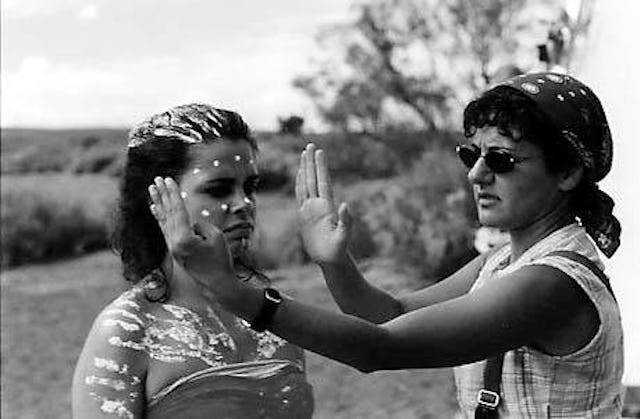Full-length feature film, inspired by the Baha'i writings, premieres in Australia
PERTH, Australia — A tale of love and oppression, set in Australia's Outback in the 1890s and focusing on the story of an Aboriginal girl and a group of Lutheran missionaries, had its world premiere at the Perth International Arts Festival today.
The full-length feature film, entitled "Serenades," was written and directed by Mojgan Khadem, an Iranian-born Baha'i from Adelaide, South Australia. The film received a glowing review ahead of its release in an industry publication, Screen International, where critic Frank Hatherley described it as an international gem."
"Sandra Levy's production is a small miracle, with exquisite landscape cinematography by Russell Boyd and a moving cross-ethnic soundtrack," Mr. Hatherley wrote.
Shot on location in the South Australian outback, Serenades is Ms. Khadem's first feature film. It stars Alice Haines and Aden Young. Producer Sandra Levy and director of photography Russell Boyd both have a long list of major films to their credit.
"Serenades" is set in the 1890s when German Lutheran missionaries were trying to bring Christianity to South Australia's Aboriginal people. It tells the story of a young woman who has an Afghan father and an Aboriginal mother.
"The film does have a love story at the very center of it," said Ms. Khadem. "It's basically a journey of one woman through very diverse cultures and religions. And it's a journey where she is desperately searching for identity, for a sense of love."
Ms. Khadem said she found her inspiration for the story in the Baha'i writings.
"One day when I was reading the Book of Certitude, I came across a quote from Baha'u'llah, which made it very clear what my film needed to be about. It needed to be about oppression, and what that oppression meant," she explained.
"At the centre of that idea was an Aboriginal girl who felt this grave oppression that Baha'u'llah speaks about, where she looks everywhere for God, but she can't find Him," Ms. Khadem said.
The passage that inspired her was this: "What 'oppression' is greater than that which hath been recounted? What 'oppression' is more grievous than that a soul seeking the truth, and wishing to attain unto the knowledge of God, should know not where to go for it and from whom to seek it? For opinions have sorely differed, and the ways unto the attainment of God have multiplied."
Ms. Khadem's family left Iran in 1978, and settled in Spain as refugees before migrating to Australia three years later.
Her interest in film developed from a passion for theatre and, later, photography. She graduated from the prestigious Australian Film, Television and Radio School in Sydney, New South Wales, in 1991.
The film cost $3.7 million Australian dollars to make. More than half the funding came from Australian government's Film Finance Corporation. The rest came from the private Southern Star company and the South Australian Film Corporation. Palace Films has purchased the Australian distribution rights.
After screening for two weeks at the Perth Festival, the film is expected to open across Australia in April.
-- Reported by Susan Couhbor
